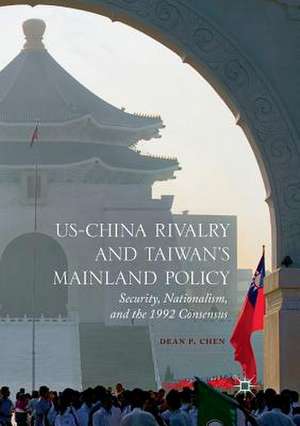US-China Rivalry and Taiwan's Mainland Policy: Security, Nationalism, and the 1992 Consensus
Autor Dean P. Chenen Limba Engleză Paperback – 19 iul 2018
This book examines changes in Taiwan’s policies toward Mainland China under former Republic of China (ROC) President Ma Ying-jeou (2008-16) and considers their implications for US policy toward the Taiwan Strait. In recent years, the People’s Republic of China (PRC)’s increasingly assertive foreign policy behaviors have heightened tensions with its regional neighbors as well as the United States. However, under the Kuomintang (KMT) administration of Ma Ying-jeou, Taiwan discounted Beijing’s coercion and pursued rapprochement on the basis of the “1992 consensus,” which was a tacit agreement reached between the KMT and Chinese Communist Party in 1992 that both Taiwan and the mainland belong to one China though that “China” is subjected to either side's different interpretations. The author of this volume analyzes why Taipei underreacted towards the security challenges posed by the PRC and chartered policies that sometimes went against the interests of Washington and its allies in the Asia-Pacific. The KMT was pushing for nation-building initiatives to rejuvenate the ROC’s “one China” ruling legitimacy and to supplant pro-independence forces within Taiwan. The island’s deeply fragmented domestic politics and partisanship have led policy elites to choose suboptimal strategy and, thereby, weakening its security position. The implications from this study are equally applicable to Taiwan’s newly elected Democratic Progressive Party government that has taken off ice in 2016.
Preț: 180.35 lei
Nou
Puncte Express: 271
Preț estimativ în valută:
34.51€ • 35.60$ • 28.80£
34.51€ • 35.60$ • 28.80£
Carte disponibilă
Livrare economică 05-19 martie
Preluare comenzi: 021 569.72.76
Specificații
ISBN-13: 9783319837789
ISBN-10: 3319837788
Pagini: 207
Ilustrații: XIX, 207 p. 6 illus., 2 illus. in color.
Dimensiuni: 148 x 210 mm
Greutate: 0.28 kg
Ediția:Softcover reprint of the original 1st ed. 2017
Editura: Springer International Publishing
Colecția Palgrave Macmillan
Locul publicării:Cham, Switzerland
ISBN-10: 3319837788
Pagini: 207
Ilustrații: XIX, 207 p. 6 illus., 2 illus. in color.
Dimensiuni: 148 x 210 mm
Greutate: 0.28 kg
Ediția:Softcover reprint of the original 1st ed. 2017
Editura: Springer International Publishing
Colecția Palgrave Macmillan
Locul publicării:Cham, Switzerland
Cuprins
1. Introduction: The Xi-Ma Summit Meeting and U.S. Interests across the Taiwan Strait
2. Politics beyond the Water’s Edge: Neoclassical Realism
3. Defining One China
4. The KMT Rebuilds the ROC: Useful Foreign Foe and Enemies from Within
5. U.S. Strategic Ambiguity, Rising China, and Taiwan’s Security
6. Tsai Ing-wen and the Weakening of the “1992 Consensus”
Notă biografică
Dean P. Chen is Associate Professor of Political Science at the Ramapo College of New Jersey, USA. He is the author of US Taiwan Strait Policy: The Origins of Strategic Ambiguity (2012) and several journal articles that appeared in Asian Survey, Asian Security, International Relations of the Asia-Pacific, and the American Journal of Chinese Studies.
Textul de pe ultima copertă
This book examines changes in Taiwan’s policies toward Mainland China under former Republic of China (ROC) President Ma Ying-jeou (2008-16) and considers their implications for US policy toward the Taiwan Strait. In recent years, the People’s Republic of China (PRC)’s increasingly assertive foreign policy behaviors have heightened tensions with its regional neighbors as well as the United States. However, under the Kuomintang (KMT) administration of Ma Ying-jeou, Taiwan discounted Beijing’s coercion and pursued rapprochement on the basis of the “1992 consensus”. The author of this volume analyzes why Taipei underreacted towards the security challenges posed by the PRC and chartered policies that sometimes went against the interests of Washington and its allies in the Asia-Pacific. The KMT was pushing for nation-building initiatives to rejuvenate the ROC’s “one China” ruling legitimacy and to supplant pro-independence forces within Taiwan. The island’s deeply fragmented domestic politics and partisanship have led policy elites to choose suboptimal strategy, weakening its security position. The implications from this study are equally applicable to Taiwan’s Democratic Progressive Party government that has taken office in 2016.
Caracteristici
Provides the most detailed and sophisticated analysis of Ma's cross-Strait policy to date
Offers insight into the evolution of US policy toward the Taiwan Strait and in particular the strategic ambiguity in Washington's policy toward Taiwan
Contributes to neo-classical realist theory
Offers insight into the evolution of US policy toward the Taiwan Strait and in particular the strategic ambiguity in Washington's policy toward Taiwan
Contributes to neo-classical realist theory
